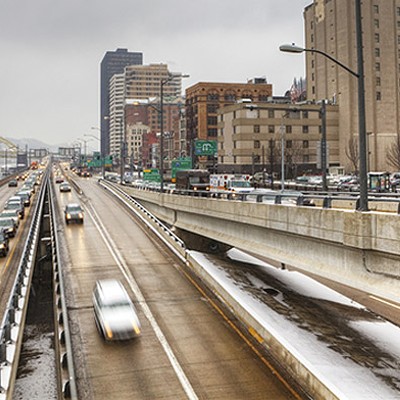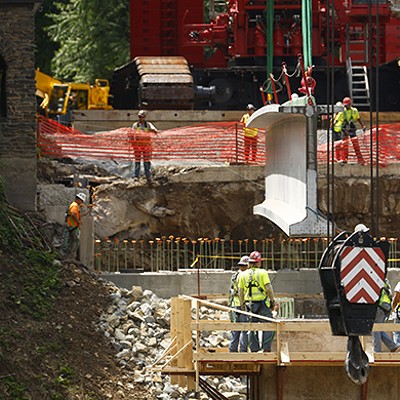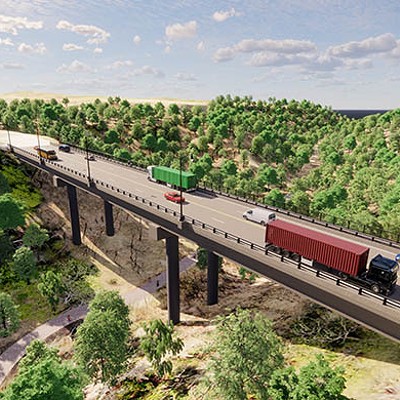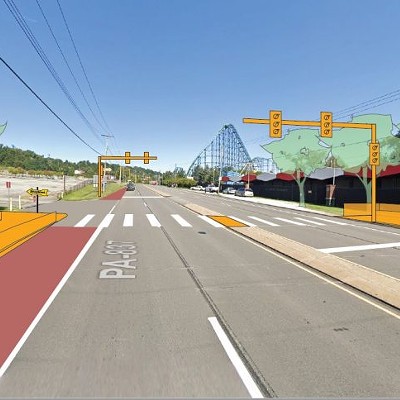Pennsylvania Turnpike Commission increasing tolls and adding lanes, but does it need to?
“We keep building new highways we don't need, and that hurts our ability to move toward a smart 21st century transportation system"
Adding more lanes to a busy highway does not reduce congestion. In 2011, the Katy Freeway in Houston was widened to a 13-lane behemoth at a cost of more than $2 billion. Three years later, studies found that rush-hour travel times actually increased by about 25 minutes.
Now in Pennsylvania, the Turnpike Commission is raising tolls in order to help pay for a widening project on hundreds of miles of I-76, the main turnpike.
Starting Jan. 6, a trip from Pittsburgh to Philadelphia will cost turnpike drivers $39.30 cash or $27.90 using an E-ZPass, an extra $2.30 or $1.61, respectively.
The Turnpike Commission, which is deeply in debt, says it has to increase tolls in order cover a $450 million annual payment to PennDOT. That payment is used to fund public transit, bike and pedestrian improvements, and was secured as part of Act 89, a massive funding bill passed under former Gov. Tom Corbett (R-Allegheny). Pennsylvania public-transit authorities, particularly the Port Authority of Allegheny County, were in severe financial distress before Act 89 was passed. Port Authority relies on Act 89 funds for more than half of its revenue.
But the Turnpike Commission is also in the midst of a massive expansion project on 470 miles of its roads. That project would add an extra lane in each direction to most of the main I-76, as well as the Northeast extension (I-476) from Philadelphia to Scranton. The entire project is estimated to cost $6.9 billion.
And according to a report by consumer advocacy group PennPIRG, the turnpike expansion is a waste of government money and deemed a “highway boondoggle.”
“The money we spend today decides how we get around tomorrow,” said Matthew Casale of PennPIRG in a press release. “We need to start solving our transportation problems, from potholes to pollution, and not waste money on the type of highway projects that should be in our rearview mirror.”
The Turnpike Commission is $11 billion in debt. Casale takes issue with the Turnpike Commission’s framing that their financial problems are due to their dedicated funding to public transit, and not because of infrastructure expansion projects. He says state agencies should want to expand public transit, not put it in jeopardy.
Turnpike Commission spokesperson Carl DeFebo did not respond to specific questions about the PennPIRG report.
The main turnpike is the oldest expressway in the country and has been going through a decades-long upgrade; more than 130 miles have been upgraded. A 2016 PennDOT report calls the reconstruction project, which includes widening, the "highest priority highway program." But PennPIRG report argues adding lanes to the turnpike is unnecessary.
This isn’t the first time the Turnpike Commission has been accused of building unnecessary projects. In 2017, local leaders like Allegheny County Executive Rich Fitzgerald were initially opposed to extending the commission's Mon-Fayette Expressway from Jefferson Hills to Monroeville. According to the Pittsburgh Post-Gazette, Pittsburgh Mayor Bill Peduto had concerns at the time if the Mon-Fayette was “the No. 1 priority for transportation for Allegheny County.”
Only after it was revealed the funding had to be spent on the Mon-Fayette thanks to Act 61 of 1985, did leaders reverse course.
However, the widening project is not an Act 61 project, according to DeFebo. Act 61 projects are funded from fuel and vehicle taxes and are written into law, so they must be completed. According to PennLive, the widening project is funded through toll revenue. It is unclear if the Turnpike Commission is obligated by law to widen the turnpike.
DeFebo did not respond to follow-up requests for clarification on funding for the widening project.
The PennPIRG report was co-authored by the Frontier Group, and Frontier analyst Gideon Weissman questioned the Turnpike Commission’s priorities.
“From 2008 to 2015, state highway debt more than doubled to $217 billion,” said Gideon Weissman, a Frontier Group analyst and report co-author. “We keep building new highways we don't need, and that hurts our ability to move toward a smart 21st century transportation system that works for all of us.”
Studies have shown widening highways doesn’t reduce congestion. According to a 2017 paper from the Transportation Research Record, for every 1 percent increase in highway capacity, traffic increases 0.29 to 1.1 percent five years after completion, and about 0.68 percent after one to two years.
“We need to be smarter about how we spend our transportation dollars. Now and in the future, Pennsylvania should have less pollution, less gridlock and more public transit,” said Casale. “We have the tools to build a better transportation system. We just need to use them.”
Now in Pennsylvania, the Turnpike Commission is raising tolls in order to help pay for a widening project on hundreds of miles of I-76, the main turnpike.
Starting Jan. 6, a trip from Pittsburgh to Philadelphia will cost turnpike drivers $39.30 cash or $27.90 using an E-ZPass, an extra $2.30 or $1.61, respectively.
The Turnpike Commission, which is deeply in debt, says it has to increase tolls in order cover a $450 million annual payment to PennDOT. That payment is used to fund public transit, bike and pedestrian improvements, and was secured as part of Act 89, a massive funding bill passed under former Gov. Tom Corbett (R-Allegheny). Pennsylvania public-transit authorities, particularly the Port Authority of Allegheny County, were in severe financial distress before Act 89 was passed. Port Authority relies on Act 89 funds for more than half of its revenue.
But the Turnpike Commission is also in the midst of a massive expansion project on 470 miles of its roads. That project would add an extra lane in each direction to most of the main I-76, as well as the Northeast extension (I-476) from Philadelphia to Scranton. The entire project is estimated to cost $6.9 billion.
And according to a report by consumer advocacy group PennPIRG, the turnpike expansion is a waste of government money and deemed a “highway boondoggle.”
“The money we spend today decides how we get around tomorrow,” said Matthew Casale of PennPIRG in a press release. “We need to start solving our transportation problems, from potholes to pollution, and not waste money on the type of highway projects that should be in our rearview mirror.”
The Turnpike Commission is $11 billion in debt. Casale takes issue with the Turnpike Commission’s framing that their financial problems are due to their dedicated funding to public transit, and not because of infrastructure expansion projects. He says state agencies should want to expand public transit, not put it in jeopardy.
Turnpike Commission spokesperson Carl DeFebo did not respond to specific questions about the PennPIRG report.
The main turnpike is the oldest expressway in the country and has been going through a decades-long upgrade; more than 130 miles have been upgraded. A 2016 PennDOT report calls the reconstruction project, which includes widening, the "highest priority highway program." But PennPIRG report argues adding lanes to the turnpike is unnecessary.
This isn’t the first time the Turnpike Commission has been accused of building unnecessary projects. In 2017, local leaders like Allegheny County Executive Rich Fitzgerald were initially opposed to extending the commission's Mon-Fayette Expressway from Jefferson Hills to Monroeville. According to the Pittsburgh Post-Gazette, Pittsburgh Mayor Bill Peduto had concerns at the time if the Mon-Fayette was “the No. 1 priority for transportation for Allegheny County.”
Only after it was revealed the funding had to be spent on the Mon-Fayette thanks to Act 61 of 1985, did leaders reverse course.
However, the widening project is not an Act 61 project, according to DeFebo. Act 61 projects are funded from fuel and vehicle taxes and are written into law, so they must be completed. According to PennLive, the widening project is funded through toll revenue. It is unclear if the Turnpike Commission is obligated by law to widen the turnpike.
DeFebo did not respond to follow-up requests for clarification on funding for the widening project.
The PennPIRG report was co-authored by the Frontier Group, and Frontier analyst Gideon Weissman questioned the Turnpike Commission’s priorities.
“From 2008 to 2015, state highway debt more than doubled to $217 billion,” said Gideon Weissman, a Frontier Group analyst and report co-author. “We keep building new highways we don't need, and that hurts our ability to move toward a smart 21st century transportation system that works for all of us.”
Studies have shown widening highways doesn’t reduce congestion. According to a 2017 paper from the Transportation Research Record, for every 1 percent increase in highway capacity, traffic increases 0.29 to 1.1 percent five years after completion, and about 0.68 percent after one to two years.
“We need to be smarter about how we spend our transportation dollars. Now and in the future, Pennsylvania should have less pollution, less gridlock and more public transit,” said Casale. “We have the tools to build a better transportation system. We just need to use them.”


















